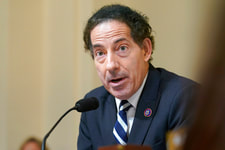weekly column
|
Each week, find a commentary on something connected to verses of Torah or another source of wisdom
|
|
Each week, find a commentary on something connected to verses of Torah or another source of wisdom
|
 ONE-WAY STREET Wisdom Wherever You Find It People place their hand on the Bible and swear to uphold the Constitution; they don’t place their hand on the Constitution and swear to uphold the Bible. Rep. Jamie Raskin In most cities, some streets are two-way and some are one-way. Lots of things in life are that way, too. Your breath flows in and out of the same tubes in your body, but you want each corpuscle to follow all the others in the vessels that carry blood to and from your heart. A movie or book can move back and forth in time, but a working clock moves in only one direction. And while memory can, in some cases, shift and change, there remain some things you just can’t unsee. A friend of mine is the grandson of a renown rabbi. The rabbi once shared his pulpit with a cantor whose musical abilities were remarkable, but who valued his renditions of the prayers over their accuracy. My friend told me of the time the cantor, in embellishing a phrase from a central moment in the service, sang “David ben Yishai, Yishai ben David.” Musically it was lovely. But what he sang was “David son of Jesse, Jesse son of David.” Wrong way down a one-way street. I will acknowledge that things are not always as clear-cut in imagining the direction that things flow – think chicken and egg. But it is not the case with the disease of historical revisionism that has afflicted some Christians in the United States. It has variations and multiple names – Christian nationalism, Biblical patriotism, “corrections” to the accepted knowledge about our founders – but it is part and parcel of the attempt to convince water to flow uphill. No amount of conviction or faith can legitimate the notion that our founders looked into the Bible to construct the Declaration of Independence and/or the Constitution. Rep. Raskin, who is a scholar of the Constitution and, though Jewish in his identity, secular in his outlook, has correctly identified the one-way street every public official travels. To be accurate, one need not place a hand on the Bible to swear to uphold the Constitution. I am guessing Rep. Raskin did not. The symbolism of the Bible – or the Qur’an, or the Baghavad Gita, or the Kitáb-i-Aqdas -- is to impress on the incoming president, mayor, zoning commissioner, or secretary of state that the oath of performance that they are about to proclaim must be as authoritative in public life as heretofore Scripture has been in their private life. Indeed, our collective agreement that raising a right hand during the swearing of an oath is as effective as adding a Bible under the left or “so help me God” to the declaration further illustrates that the integrity of any office relies on the commitment to the ultimate authority of the Constitution to determine our laws and values. To borrow a notion, this truth ought to be self-evident. Unfortunately, it is not. By plucking a phrase selectively from the beginning of the First Amendment that guarantees freedom of conscience (“the free exercise” of religion) and ignoring the immediately preceding phrase that prohibits “an establishment of religion,” a segment of the Christian population concludes that if they believe deeply enough in the authority of the Bible in civil society, the Constitution protects and endorses their convictions. That may be a harmless self-delusion in private, but when an individual – or more dangerously, a group of individuals – attempts to act on that delusion, the result can call into question the legitimacy of the democratic process and the rule of law. When legislatures and courts, after hearing arguments from all sides (including those grounded in faith) reach a conclusion, it is binding on all citizens, not just on those without an objection based in religious belief. The rights guaranteed by our Constitution include equal treatment under the law. By the same token, a citizen may choose not to take advantage of a legally available opportunity. No one is obligated to read everything protected by the right to free expression. No one is obligated to petition the government for redress of grievances. No one is obligated to terminate a pregnancy. Yet, neither is anyone permitted to deny another citizen their own exercise of those legally protected rights. I am hoping that all of these matters are obvious, certainly for private citizens and most especially for those in public service, and even more so for legislators and judges. Whatever personal devotions lead an individual to public service, they are protected by the Constitution. But it is a one-way street, like David son of Jesse. In the end, whatever the correct word for “sacred” might be in civil society, the Constitution is it. No amount of indignation, no level of volume and no uncompromising affirmation can change that. I would swear to it.
0 Comments
Leave a Reply. |
Archives
October 2023
Categories |